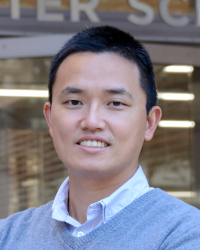洪士涵 Shih-Han Hung
主要研究領域:
量子計算、量子演算法、量子密碼學、量子程式語言Major Research Areas:
Quantum Computing, Quantum Algorithms, Quantum Cryptograpy, Quantum Programming Language研究領域摘要:
Research Summary:
Shih-Han Hung has been actively advancing quantum information science and theoretical computer science since his graduate studies.
His research on quantum cryptography focuses on rigorous security analysis in the quantum world and exploring cryptography applications with near-term quantum devices. He has been studying the computational power of near-term quantum devices and quantum cryptography, leading him to propose the first certified randomness protocol from sampling-based supremacy experiments. He has been investigating classical verification of quantum devices, and proposed schemes to quantify quantum resources of fully uncharacterized devices.
His research on quantum programming languages focuses on enabling automated verification of quantum programs. Over the past few years, he participated in the project of verified optimization of quantum programs, where he and his collaborators exploited theorem provers to verify the absence of error in circuit optimization. He built formal verification systems that allow for syntactically verifying the robustness of quantum programs and differential quantum programs. His current focus is to develop efficient verification methods with classical or quantum computers.

-
Ph.D.
Computer Science, University of Maryland, 2021
-
Address
EE2-548,
Department of Electrical Engineering,
National Taiwan University,
Taipei 106, Taiwan -
Phone
+886-2-33663620 -
Email:

-
Personal Homepage
https://hungshihhan.github.io
代表性著作 Selected Publication
- Liu,Shaydulin,Niroula,DeCross,Hung,Kon,Cervero-Martín,Chakraborty,Amer,Aaronson,Acharya,Alexeev,Berg,Chakrabarti,Curchod,Dreiling,Erickson,Foltz,Foss-Feig,Hayes,Humble,Kumar,Larson,Lykov,Mills,Moses,Neyenhuis,Eloul,Siegfried,Walker,Lim,Pistoia, “Certified randomness using a trapped-ion quantum processor,” Nature, 640, 343, Mar. 2025
- Scott Aaronson, Shih-Han Hung , “Certified Randomness from Quantum Supremacy,” The 55th ACM Symposium on Theory of Computing (STOC 2023), 933, Orlando, Florida, Jun. 2023
- Kesha Hietala, Robert Rand, Shih-Han Hung, Xiaodi Wu, Michael Hicks, “A Verified Optimizer for Quantum Circuits,” The 48th ACM SIGPLAN Symposium on Principles of Programming Languages (POPL 2021), 1, Jan. 2021
- Shih-Han Hung, Kesha Hietala, Shaopeng Zhu, Mingsheng Ying, Michael Hicks, Xiaodi Wu , “Quantitative robustness analysis of quantum programs,” The 46th ACM SIGPLAN Symposium on Principles of Programming Languages (POPL 2019), 31:1, Jan. 2019